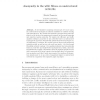Free Online Productivity Tools
i2Speak
i2Symbol
i2OCR
iTex2Img
iWeb2Print
iWeb2Shot
i2Type
iPdf2Split
iPdf2Merge
i2Bopomofo
i2Arabic
i2Style
i2Image
i2PDF
iLatex2Rtf
Sci2ools
117
click to vote
PET
2007
Springer
2007
Springer
Anonymity in the Wild: Mixes on Unstructured Networks
Abstract. As decentralized computing scenarios get ever more popular, unstructured topologies are natural candidates to consider running mix networks upon. We consider mix network topologies where mixes are placed on the nodes of an unstructured network, such as social networks and scale-free random networks. We explore the efficiency and traffic analysis resistance properties of mix networks based on unstructured topologies as opposed to theoretically optimal structured topologies, under high latency conditions. We consider a mix of directed and undirected network models, as well as one real world case study – the LiveJournal friendship network topology. Our analysis indicates that mix-networks based on scale-free and small-world topologies have, firstly, mix-route lengths that are roughly comparable to those in expander graphs; second, that compromise of the most central nodes has little effect on anonymization properties, and third, batch sizes required for warding off intersec...
| Added | 09 Jun 2010 |
| Updated | 09 Jun 2010 |
| Type | Conference |
| Year | 2007 |
| Where | PET |
| Authors | Shishir Nagaraja |
Comments (0)

